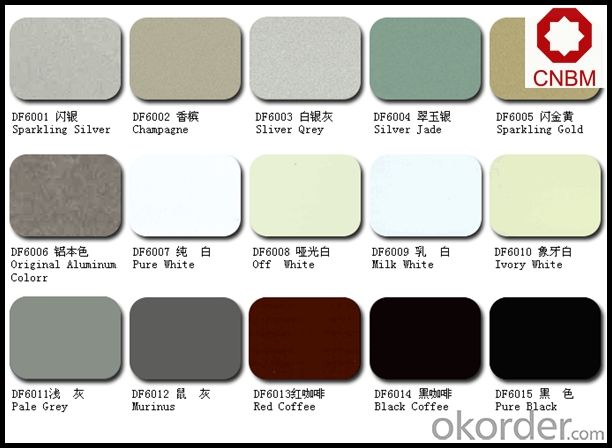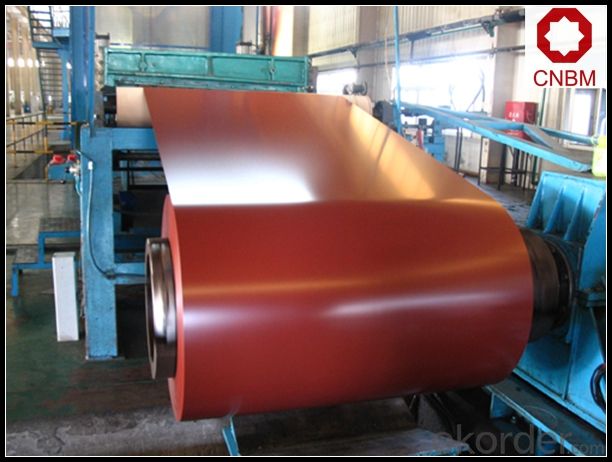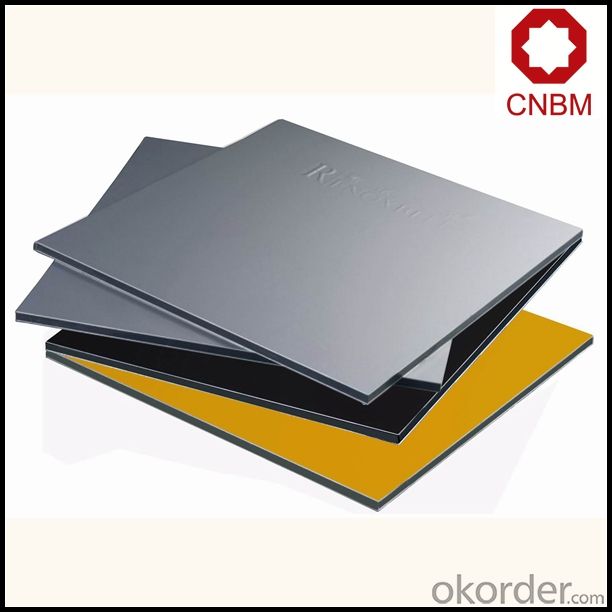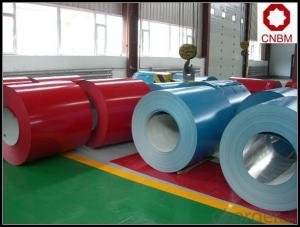PE/PVDF Color Coated Aluminum Coil 0.6mm 3003 3105 5052
- Loading Port:
- Shanghai
- Payment Terms:
- TT OR LC
- Min Order Qty:
- 5 m.t.
- Supply Capability:
- 10000 m.t./month
OKorder Service Pledge
OKorder Financial Service
You Might Also Like
Item specifice
1. Specification of PE/PVDF Color Coated Aluminum Coil 0.6mm 3003 3105 5052
Alloy: 1050, 1060, 1100, 3003, 3004, 3005, 3105, 5005, 5052, 5083, 5754
2) Temper: Various status
3) Thickness: 0.3-150mm
4) Width: 300-1950mm
5) Length: Under9500mm/ Coil
6) Weight: 2.5-5.0 tons per coil
7) Dimensions and weight can be produced according to clients' specifications.
8) Inner Diameter: 505mm, 605mm
9) Packing: Export standard, wooden pallet.
10) Delivery time: 20 days
11) Minimum order quantity: 5 tons per size.
12) The term of payment: T/T, irrevocable L/C at sight.
13) Surface: Bright
14)Origin: China
2. Application of PE/PVDF Color Coated Aluminum Coil 0.6mm 3003 3105 5052
(1).Interior: wall cladding, ceilings, bathrooms, kitchens and balconies, shutters, doors...
(2).Exterior: wall cladding, facades, roofing, canopies, tunnels,column covers , renovations...
(3).Advertisement: display platforms, signboards, fascia, shop fronts...
3. Feature of PE/PVDF Color Coated Aluminum Coil 0.6mm 3003 3105 5052
*Such coil is specially designed to replace aluminum ingot, due to the high export tax of aluminum ingot, the coil has better price than ingot.
*This type of coil can fit customer's remelting furnace just like ingot, no need to make any change to the production line that was previously used for ingot. The standard coil size and weight is very suitable for the feed gate of furnace.
*This type of coil causes less material wastage than ingot when remelted.
*Our coil is made directly from ore, no need to go though the ingot making process, quality is much better than other suppliers who use ingot scrap to make coil.
Be free from Oil Stain, Dent, Inclusion, Scratches, Stain, Oxide Dicoloration, Breaks, Corrosion, Roll Marks, Dirt Streaks and other defect which will interfere with use
4. Certificate:
SGS and ROHS(if client request, paid by client), MTC(plant provided), Certificate of Origin(FORM A, FORM E, CO), Bureau Veritas and SGS (if client request, paid by client), CIQS certificate
5. Image of PE/PVDF Color Coated Aluminum Coil 0.6mm 3003 3105 5052



6. Package and shipping of PE/PVDF Color Coated Aluminum Coil 0.6mm 3003 3105 5052
eye to wall
eye to the wall
with wood pallet (wooded case also available)
7. FAQ
1) What is the delivery time?
Dpends on actual order, around 20 to 35 days
2)What is the QC system:
We have QC staff of 20 persons and advanced equipment, each production is with MTC traced from Aluminum ingot lot.
3) What market do you mainly sell to?
Australia, America, Asia, Middle East, Western Europe, Africa etc
- Q:Are aluminum coils compatible with different joining methods?
- Yes, aluminum coils are compatible with different joining methods. Aluminum is a highly versatile metal that can be joined using various techniques such as welding, brazing, soldering, and mechanical fastening. The choice of joining method depends on the specific application and the desired properties of the joint. Welding is commonly used to join aluminum coils as it provides a strong and durable bond. Several welding techniques like MIG (Metal Inert Gas), TIG (Tungsten Inert Gas), and resistance welding can be used depending on the thickness and type of aluminum alloy being joined. Brazing is another effective method for joining aluminum coils. It involves the use of a filler material that has a lower melting point than the base metal, which is heated to create a strong joint. Brazing is commonly used when the aluminum coils need to be joined to other dissimilar metals. Soldering is suitable for joining thin aluminum coils or when a lower temperature method is required. It involves melting a low-temperature alloy (solder) to join the coils together. Soldering is commonly used in electronics and plumbing applications. Mechanical fastening methods such as bolts, screws, rivets, or clips can also be used to join aluminum coils. These methods provide a reliable and removable joint, making them suitable for applications where disassembly may be required. In summary, aluminum coils are compatible with various joining methods, including welding, brazing, soldering, and mechanical fastening. The choice of joining method depends on factors such as the application, the type of aluminum alloy, and the desired properties of the joint.
- Q:Are aluminum coils resistant to oil and grease?
- Aluminum coils typically possess resistance against oil and grease. They exhibit a natural ability to resist corrosion and are not easily influenced by most solvents, including oil and grease. This characteristic renders aluminum coils a suitable option for diverse applications that involve potential contact with oils or greases, such as the automotive and HVAC sectors. Nevertheless, it is crucial to acknowledge that extended exposure to particular aggressive chemicals or high concentrations of oil or grease may gradually result in damage or deterioration of the aluminum coils. Consequently, it is advisable to diligently clean and maintain the coils to guarantee their optimal functioning and durability.
- Q:Can aluminum coils be used in signage applications?
- Indeed, signage applications can make use of aluminum coils. The durability, corrosion resistance, and lightweight characteristics of aluminum render it a favored material for signage purposes. Aluminum can effortlessly take on different shapes and sizes, making it suitable for a wide range of signage types, including outdoor signs, billboards, trade show displays, and more. Furthermore, aluminum coils boast exceptional weather resistance, guaranteeing the preservation of the signage's integrity and vibrancy even in harsh environmental circumstances. The versatility and longevity of aluminum establish it as the preferred option for signage applications across diverse industries.
- Q:remember maybe a decade ago or so, copper used to be cheaper than aluminum. now it is the other way around, copper is more expensive. Even copper pennies cost more so I heard they are mixed with another metal to make a penny. What caused the change in value and when did it really start happening?In fact, copper has become valuble enough to steal. Some factories which have copper, have had their metals stolen, but outsiders who break into the factories to specifically take the copper. Then the factories started hiring security to prevent intruders from taking the copper.
- The two metals are a long way apart on the electro-chemical scale. This means that if they come into contact, a small - but significant - voltage will exist between them - completely independent of what currents are actually in the wires. This small voltage causes corrosion of both metals: not good!
- Q:I was wandering, if your spear's shaft is made of aluminum, does that have any strength to it, i mean, say you had to block with the shaft, would a weapon break through like your basic sword or basic axe, i don't mean big heavy swords and axes, but like average ones, could it break through an aluminum shaft of a spear?
- From my understanding aluminum weapons are only for exhibitions and never for anything close to real, let alone impact. Aluminum can be a strong/durable metal, but in the end it can hardly hold up against wood like pine, let alone oak. There's also here-say about aluminum shattering. I don't really know what that's about, but I have heard a rumor that about some doing so, whatever the extend of shattering really means. I wouldn't bother with aluminum when there's very fine woods that can be used instead. Aluminum is also cheap and it's said you get what you pay for. Personally, I'd forget aluminum and go with a hard wood.
- Q:Are aluminum coils compatible with other materials?
- Indeed, other materials can be used in tandem with aluminum coils. Aluminum, being a versatile and extensively utilized substance, readily blends with various materials for different purposes. Take, for instance, the utilization of aluminum coils alongside copper tubing in air conditioning and refrigeration systems to amplify heat transfer efficiency. Furthermore, aluminum coils can be coated or layered with polymers or paints to furnish supplementary safeguard against corrosion, enhance visual appeal, or elevate specific performance attributes. Consequently, aluminum coils exhibit compatibility with a multitude of materials, rendering them apt for an array of applications within industries like construction, automotive, aerospace, and beyond.
- Q:What is the lifespan of aluminum coils?
- The lifespan of aluminum coils can vary depending on various factors such as the quality of the aluminum, the manufacturing process, the environmental conditions they are exposed to, and the maintenance provided. However, on average, aluminum coils can last anywhere from 15 to 30 years. With proper care and regular maintenance, including cleaning and inspection, aluminum coils can potentially have an extended lifespan. It is important to note that regular maintenance and servicing by professionals can help identify any issues early on, allowing for timely repairs or replacements, ultimately prolonging the lifespan of aluminum coils.
- Q:How are aluminum coils used in the production of cans and containers?
- Aluminum coils are used in the production of cans and containers as they are rolled into thin sheets that can be shaped into the desired form. These coils are fed into a machine where they are cut, formed, and joined together to create the body of the can or container. The lightweight and corrosion-resistant properties of aluminum make it an ideal material for packaging, ensuring the preservation and protection of the contents inside.
- Q:What are the different color options for coated aluminum coils?
- There is a wide selection of colors available for coated aluminum coils, catering to different aesthetic preferences and project requirements. White, black, silver, gray, bronze, gold, red, blue, green, and brown are some of the commonly chosen colors for coated aluminum coils. These colors can be achieved using various coating processes and techniques, such as powder coating, PVDF coating, or polyester coating. In addition to these standard options, customers also have the opportunity to select custom colors that align with their design vision or brand identity. The versatility and flexibility of the color choices for coated aluminum coils make them suitable for a variety of applications, including building facades, roofing systems, signage, interior decoration, and more.
- Q:Are aluminum coils available in custom sizes?
- Yes, aluminum coils are available in custom sizes.
1. Manufacturer Overview |
|
|---|---|
| Location | |
| Year Established | |
| Annual Output Value | |
| Main Markets | |
| Company Certifications | |
2. Manufacturer Certificates |
|
|---|---|
| a) Certification Name | |
| Range | |
| Reference | |
| Validity Period | |
3. Manufacturer Capability |
|
|---|---|
| a)Trade Capacity | |
| Nearest Port | |
| Export Percentage | |
| No.of Employees in Trade Department | |
| Language Spoken: | |
| b)Factory Information | |
| Factory Size: | |
| No. of Production Lines | |
| Contract Manufacturing | |
| Product Price Range | |
Send your message to us
PE/PVDF Color Coated Aluminum Coil 0.6mm 3003 3105 5052
- Loading Port:
- Shanghai
- Payment Terms:
- TT OR LC
- Min Order Qty:
- 5 m.t.
- Supply Capability:
- 10000 m.t./month
OKorder Service Pledge
OKorder Financial Service
Similar products
New products
Hot products
Hot Searches
Related keywords




























